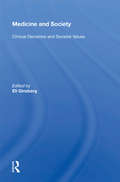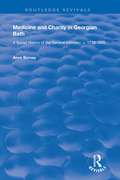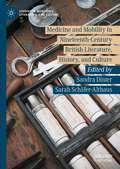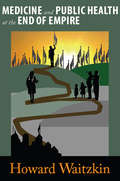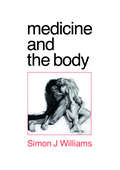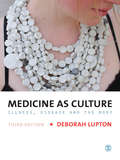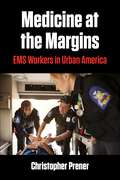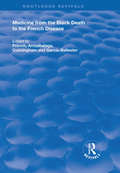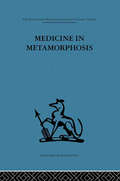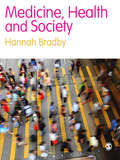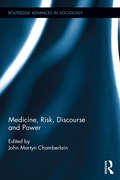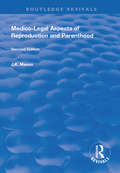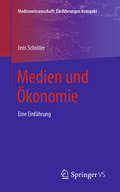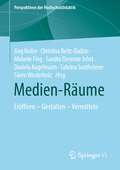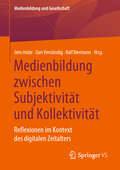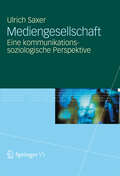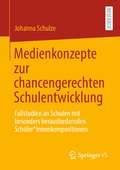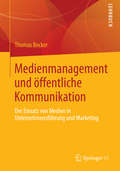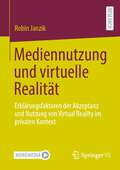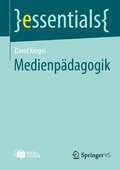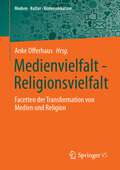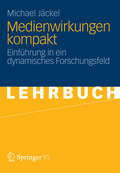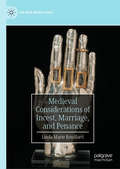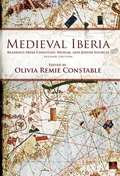- Table View
- List View
Medicine And Society: Clinical Decisions And Societal Values
by Eli GinzbergThis book, based on the Third Conference on Health Policy, is derived from those discussions that identified as a fundamental issue the translation of societal values into health care objectives and the formulation of mechanisms by which these objectives could guide the clinical decision-making.
Medicine and Charity in Georgian Bath: A Social History of the General Infirmary, c.1739-1830 (Routledge Revivals)
by Anne BorsayFirst published in 1999, this rewarding volume offers a close and systematic analysis of the General Infirmary at Bath, which was founded in 1739 to grant ‘lepers and cripples, and other indigent strangers’ access to the spa waters. Four main themes are pursued in order to locate the hospital within its economic, socio-cultural and political contexts: arrangements for management and finance under the conditions of a prospering commercial economy; the rewards and restrictions experienced by the physicians and surgeons who donated their professional services free of charge; and the constructions of an integrated social and political élite around the physical and moral rehabilitation of the sick poor. In this way, the example of Bath – a stylish resort whose visitors and residents exemplified the dynamic of fashionable philanthropy – is used to open up issues of significance to our understanding of Georgian Britain as a whole.
Medicine and Mobility in Nineteenth-Century British Literature, History, and Culture (Studies in Mobilities, Literature, and Culture)
by Sandra Dinter Sarah Schäfer-AlthausMedicine and Mobility in Nineteenth-Century British Literature, History, and Culture analyses the cultural and literary histories of medicine and mobility as entangled processes whose discourses and practices constituted, influenced, and transformed each other. Presenting case studies of novels, poetry, travel narratives, diaries, ship magazines, skin care manuals, asylum records, press reports, and various other sources, its chapters identify and discuss diverse literary, historical, and cultural texts, contexts, and modes in which medicine and mobility intersected in nineteenth-century Britain, its empire, and beyond, whereby they illustrate how the paradigms of mobility studies and the medical humanities can complement each other.
Medicine and Public Health at the End of Empire
by Howard WaitzkinThe recent financial meltdown has brought notable changes to the global practice of health care changes that have often escaped the American news media. Although Western managed-care corporations previously had strengthened their influence abroad, now many countries are considering new approaches to health care for their citizens.The untold story of how corporations have influenced global health care and the impacts now in America as the system rapidly shifts is Dr. Waitzkin s subject in his provocative new book. We now live in a new era in which the prospects for more humane approaches to health care are taking root. Strengthening access and improving public health are at the heart of the many previously little-noted struggles and actions by individuals, groups, and whole nations to put control back in the hands of patients and practitioners, as Americans of many political stripes seem to universally seek. The impacts of these changes in the United States are considerable, and they are amply illustrated by Dr. Waitzkin as the United States attempts to reorient its own system of care.Selected as the 2012 winner of the Freidson Outstanding Publication Award by the American Sociological Association for its "bold and timely analysis of the global political economy of contemporary crises in health and medical care. By presenting the lessons learned from social medicine (past and present), [it] outlines a macro-sociologically informed response to these crises.""
Medicine and the Body
by Prof Simon Johnson WilliamsThis is a clear, well-written account of medicine, health and the body. Taking recent debates on the body and society as its point of departure, the book critically reexamines a series of embodied issues and emotional agendas in health and illness. Included here are cutting edge discussions and debates concerning: <p><p> - the medicalized body - health inequalities - childhood and ageing - the dilemmas of high-tech medicine - chronic illness and disability - caring and (bio)ethics - sleep, death and dying - the body in late/postmodernity <p> Written in an accessible, engaging style, with many original and innovative insights, the book will appeal to undergraduate and postgraduate students alike, and to researchers and lecturers with an interest in the embodied agendas of health and medicine in the new millennium.
Medicine as Culture: Illness, Disease and the Body
by Deborah LuptonLupton's newest edition of Medicine as Culture is more relevant than ever. Trudy Rudge, Professor of Nursing, University of Sydney A welcome update of a text that has become a mainstay of the medical sociologist's library. Alan Radley, Emeritus Professor of Social Psychology, Loughborough University Medicine as Culture introduces students to a broad range of cross-disciplinary theoretical perspectives, using examples that emphasize bodies and visual images. Lupton's core contrast between lay perspectives on illness and medical power is a useful beginning point for courses teaching health and illness from a socio-cultural perspective. Arthur Frank, Department of Sociology, University of Calgary Medicine as Culture is unlike any other sociological text on health and medicine. It combines perspectives drawn from a wide variety of disciplines including sociology, anthropology, social history, cultural geography, and media and cultural studies. The book explores the ways in which medicine and health care are sociocultural constructions, ranging from popular media and elite cultural representations of illness to the power dynamics of the doctor-patient relationship. The Third Edition has been updated to cover new areas of interest, including: - studies of space and place in relation to the body - actor-network theory as it is applied in research related to medicine - The internet and social media and how they contribute to lay health knowledge and patient support - complementary and alternative medicine - obesity and fat politics. Contextualising introductions and discussion points in every chapter makes Medicine as Culture, Third Edition a rigorous yet accessible text for students. Deborah Lupton is an independent sociologist and Honorary Associate in the Department of Sociology and Social Policy, University of Sydney.
Medicine at the Margins: EMS Workers in Urban America (Polis: Fordham Series in Urban Studies)
by Christopher PrenerPresents a unique view of social problems and conflicts over urban space from the cab of an ambulance.While we imagine ambulances as a site for critical care, the reality is far more complicated. Social problems, like homelessness, substance abuse, and the health consequences of poverty, are encountered every day by Emergency Medical Services (EMS) workers. Written from the lens of a sociologist who speaks with the fluency of a former Emergency Medical Technician (EMT), Medicine at the Margins delves deeply into the world of EMTs and paramedics in American cities, an understudied element of our health care system.Like the public hospital, the EMS system is a key but misunderstood part of our system of last resort. Medicine at the Margins presents a unique prism through which urban social problems, the health care system, and the struggling social safety net refract and intersect in largely unseen ways. Author Christopher Prener examines the forms of marginality that capture the reality of urban EMS work and showcases the unique view EMS providers have of American urban life. The rise of neighborhood stigma and the consequences it holds for patients who are assumed by providers to be malingering is critical for understanding not just the phenomenon of non- or sub-acute patient calls but also why they matter for all patients. This sense of marginality is a defining feature of the experience of EMS work and is a statement about the patient population whom urban EMS providers care for daily. Prener argues that the pre-hospital health care system needs to embrace its role in the social safety net and how EMSs’ future is in community practice of paramedicine, a port of a broader mandate of pre-hospital health care. By leaning into this work, EMS providers are uniquely positioned to deliver on the promise of community medicine.At a time when we are considering how to rely less on policing, the EMS system is already tasked with treating many of the social problems we think would benefit from less involvement with law involvement. Medicine at the Margins underscores why the EMS system is so necessary and the ways in which it can be expanded.
Medicine from the Black Death to the French Disease (Routledge Revivals)
by Andrew Cunningham Jon Arrizabalaga Roger French Luis García-BallesterPublished in 1998, covering the period from the triumphant economic revival of Europe after the collapse of the Western Roman Empire, this book offers an examination of the state of contemporary medicine and the subsequent transplantation of European medicine worldwide.
Medicine in Metamorphosis: Speech, presence and integration
by Martti SiiralaTavistock Press was established as a co-operative venture between the Tavistock Institute and Routledge & Kegan Paul (RKP) in the 1950s to produce a series of major contributions across the social sciences. This volume is part of a 2001 reissue of a selection of those important works which have since gone out of print, or are difficult to locate. Published by Routledge, 112 volumes in total are being brought together under the name The International Behavioural and Social Sciences Library: Classics from the Tavistock Press. Reproduced here in facsimile, this volume was originally published in 1969 and is available individually. The collection is also available in a number of themed mini-sets of between 5 and 13 volumes, or as a complete collection.
Medicine, Health and Society (Bsa New Horizons In Sociology Ser.)
by Hannah BradbySharp, bold and engaging, this book provides a contemporary account of why medical sociology matters in our modern society. Combining theoretical and empirical perspectives, and applying the pragmatic demands of policy, this timely book explores society's response to key issues such as race, gender and identity to explain the relationship between sociology, medicine and medical sociology. Each chapter includes an authoritative introduction to pertinent areas of debate, a clear summary of key issues and themes and dedicated bibliography. Chapters include: * social theory and medical sociology * health inequalities * bodies, pain and suffering * personal, local and global. Brimming with fresh interpretations and critical insights this book will contribute to illuminating the practical realities of medical sociology. This exciting text will be of interest to students of sociology of health and illness, medical sociology, and sociology of the body. Hannah Bradby has a visiting fellowship at the Department of Primary Care and Health Sciences, King's College London. She is monograph series editor for the journal Sociology of Health and Illness and co-edits the multi-disciplinary journal Ethnicity and Health.
Medicine, Risk, Discourse and Power (Routledge Advances in Sociology)
by John Martyn ChamberlainThis book critically explores from a comparative international perspective the role medicine plays in constructing and managing natural and social risks, including those belonging to modern medical technology and expertise. Drawing together chapters written by professional practitioners and social scientists from the UK, South America, Australia and Europe, the book offers readers an insightful and thought-provoking analysis of how modern medicine has transformed our understanding of both ourselves and the world around us, but in so doing has arguably failed to fully recognize and account for, its unintended and negative effects. This is an essential read for social scientists, practitioners and policymakers who want to better understand how they can develop new ways of thinking about how modern medicine can promote social goods and enhance public health.
Medico-Legal Aspects of Reproduction and Parenthood (Routledge Revivals)
by J. K. MasonPublished in 1998, this work is concerned, in the main, with reproduction - for which marriage is not an essential prerequisite. Nevertheless, much of sexuality and the greater part of parenthood still subsist within the marital relationship. Sex and marriage are interdependent - indeed the definition of the latter depends on the former. After looking at the prerequisites for marriage and for making a marriage void, the author shows that the medico-legal interests of marriage relate to the mental health and the sex of the parties. The author also looks at various aspects of the sexual-familial relationship, including contraception, sterilization, abortion, protection of the foetus, foetal experimentation, the infertile husband, the infertile woman, defective neonates and infants, consent to treatment and research in children, the protection of young children and the killing of children within the family. Cases are used to highlight the legal aspects of these subjects.
Medien und Ökonomie: Eine Einführung (Medienwissenschaft: Einführungen kompakt)
by Jens SchröterDer Band führt in die Literatur zu den verschiedenen Aspekten des Verhältnisses von Medien und Ökonomie ein. Dass "die Medien" und "die Ökonomie" in einem engen Verhältnis stehen, scheint zumindest hinsichtlich der Medienindustrie offensichtlich zu sein. Doch wäre es zu eng, die Fragen nach Medien und Ökonomie darauf zu reduzieren. So setzt z.B. die Ökonomie ihrerseits immer schon verschiedene und sich wandelnde Formen von Medien voraus und ferner ist "die Ökonomie" auch Gegenstand medialer Darstellungen.
Medien-Räume: Eröffnen – Gestalten – Vermitteln (Perspektiven der Hochschuldidaktik)
by Jörg Noller Christina Beitz-Radzio Daniela Kugelmann Sabrina Sontheimer Sören Westerholz Melanie Förg Sandra Eleonore JohstLehren und Lernen, verstanden als komplexe Vermittlung und Verarbeitung von Inhalten, findet immer in räumlichen Kontexten statt, die hinderlich oder förderlich sein können. Diese Räume können von ganz verschiedener Art sein und sie müssen sich keineswegs auf den Hörsaal und Seminarraum beschränken. Der Sammelband, der aus zwei Symposien des Münchner-Dozierenden-Netzwerks in den Jahren 2020 und 2021 hervorgegangen ist, möchte diese Räume erkunden, medial reflektieren und zugleich neue Räume für die Lehre eröffnen. Folgende Fragen stehen dabei im Zentrum: Welche Lehr- und Lernräume innerhalb und außerhalb der Hochschule haben sich bislang bewährt? Wo liegen ihre Grenzen, wo ihre Möglichkeiten? Wie lassen sich Lehr- und Lernräume gestalten? Welche Materialien, welche Technik und welche Medien haben sich bewährt oder bieten neue Möglichkeiten?
Medienbildung zwischen Subjektivität und Kollektivität: Reflexionen im Kontext des digitalen Zeitalters (Medienbildung und Gesellschaft #45)
by Ralf Biermann Dan Verständig Jens HolzeDer Band vereint ausgewählte interdisziplinäre Zugänge zu Entwicklungen und Problemstellungen rund um das Verhältnis von Subjektivität und Kollektivität. Die Autorinnen und Autoren gehen dabei der Frage nach, wie Konzepte von Subjektivität und Kollektivität im digitalen Zeitalter angemessen beschrieben und für eine zeitgenössische Theoriebildung gewendet werden können. Es werden Themen, wie kollektive Grenzüberschreitung, Vernetzung als Subjektivierungsform und sozio-mediale Habituskonfigurationen im Horizont der Medienbildung verhandelt. Damit leistet der Band auch einen Beitrag zum Diskurs um das Verhältnis von Bildung und Subjektivierung.
Medienkonzepte zur chancengerechten Schulentwicklung: Fallstudien an Schulen mit besonders herausfordernden Schüler*innenkompositionen
by Johanna SchulzeJohanna Schulze untersucht in ihrer Arbeit mithilfe längsschnittlich angelegter Fallstudien und eines Mixed-Methods-Ansatzes die forschungsleitende Fragestellung, inwiefern und unter welchen Bedingungen schulische Medienkonzepte ihr Potenzial als Instrumente der Schulentwicklung an Schulen der Sekundarstufe I mit besonders herausfordernden Schüler*innenkompositionen im Bundesland Nordrhein-Westfalen entfalten können. Mit den Ergebnissen werden hemmende und förderliche Bedingungsfaktoren für den Implementierungsprozess schulischer Medienkonzepte auf den unterschiedlichen Ebenen von Schule offengelegt und auf einen inhaltlichen Entwicklungsbedarf dieser verwiesen.
Medienmanagement und öffentliche Kommunikation: Der Einsatz von Medien in Unternehmensführung und Marketing
by Thomas BeckerWie setzt man Medien und Kommunikation ein, um unternehmerische Ziele zu erreichen? Das ist das Thema des Fachgebiets Medienmanagement. Im Medienmanagement unterscheidet man zwei Disziplinen: Medien und Kommunikation als Mittel der Unternehmensführung sowie Medien und Kommunikation als strategisches Instrument im Marketing. Beide Aspekte stellt das Lehrbuch Medienmanagement und öffentliche Kommunikation für Studium und Berufspraxis vor und dient damit als Kompass für die Anwendung erfolgreicher Unternehmenskommunikation.
Mediennutzung und virtuelle Realität: Erklärungsfaktoren der Akzeptanz und Nutzung von Virtual Reality im privaten Kontext
by Robin JanzikVirtual Reality (VR) gilt als zukunftsträchtige Medientechnologie mit innovativen Anwendungsmöglichkeiten für private Nutzer in den Bereichen Unterhaltung, Information und Kommunikation. Trotz des immensen Potenzials, zu verändern, wie Menschen mit Medien interagieren, bleibt die gesellschaftliche Diffusion von VR hinter den Erwartungen zurück. Das Verständnis darüber, welche Faktoren Einstellungen zu und die Nutzung von VR erklären, ist limitiert. Bisherige Forschung ist stark fragmentiert und hat sich kaum mit den Spezifika der Technologie im Hinblick auf die private Nutzung auseinandergesetzt. Vor diesem Hintergrund entwirft Robin Janzik ein auf Akzeptanz mit den Bezugspunkten Motivation, Vertrauen, Ressourcen und Umfeld basierendes Erklärungsmodell, das relevante weitere individuelle, technologische und soziale Faktoren berücksichtigt. Drei empirische Studien bestätigen die Eignung des Modells zur Erklärung der Akzeptanz und Nutzung von VR. Die Ergebnisse stützen die Rolle von Akzeptanz als zentralen Erklärungsmechanismus der Nutzung neuer Technologien und legen nahe, dass Einstellungen zu und die Nutzung von VR auf einem komplexen Zusammenspiel individueller, technologischer und sozialer Faktoren basieren. Diese Erkenntnisse decken den Bedarf nach einer weiteren kommunikationswissenschaftlichen Auseinandersetzung mit dem Medium VR auf.
Medienpädagogik (essentials)
by David KergelDer vorliegende Band liefert eine kurze praxisorientierte Einführung in die Medienpädagogik. Dabei wird die Geschichte der Medienpädagogik von der Bewahrpädagogik über eine handlungs- und produktionsorientierte Medienpädagogik bis hin zum Begriff der Medienkompetenz dargestellt. Zudem werden Eckpunkte zeitgemäßer Medienpädagogik in einer digitalen Gesellschaft skizziert sowie die Rahmenbedingungen bzw. die Infrastruktur medienpädagogischen Arbeitens beschrieben. Ergänzt wird das Buch durch einen Onlinekurs. Den kostenlosen Zugang zum Onlinekurs finden Sie direkt im Buch.
Medienvielfalt - Religionsvielfalt: Facetten der Transformation von Medien und Religion (Medien • Kultur • Kommunikation)
by Anke OfferhausAusgehend von der kommunikativen Konstruktion von Religion analysiert der Band die grundlegende Fragen, welchen Stellenwert Medien für die Konstruktion religiöser sozialer Wirklichkeiten haben und in welchem Verhältnis dabei Medienwandel und der Wandel von Religion stehen. Der interdisziplinäre Sammelband zielt vor dem Hintergrund des Mediatisierungsansatzes auf die Zusammenführung der bislang wechselseitig wenig zur Kenntnis genommenen sozialwissenschaftlichen Forschungen renommierter deutschsprachiger Wissenschaftler/innen. Darüber hinaus widmet er sich einem in allen Disziplinen bislang wenig diskutiertem Zusammenhang, nämlich dem Verhältnis von Medien und Religion im sozialen Wandel.
Medieval Considerations of Incest, Marriage, and Penance (The New Middle Ages)
by Linda Marie RouillardMedieval Considerations of Incest, Marriage, and Penance focuses on the incest motif as used in numerous medieval narratives. Explaining the weakness of great rulers, such as Charlemagne, or the fall of legendary heroes, such as Arthur, incest stories also reflect on changes to the sacramental regulations and practices related to marriage and penance. Such changes demonstrate the Church's increasing authority over the daily lives and relationships of the laity. Treated here are a wide variety of medieval texts, using as a central reference point Philippe de Rémi's thirteenth-century La Manekine, which presents one lay author's reflections on the role of consent in marriage, the nature of contrition and forgiveness, and even the meaning of relics. Studying a variety of genres including medieval romance, epic, miracles, and drama along with modern memoirs, films, and novels, Linda Rouillard emphasizes connections between medieval and modern social concerns. Rouillard concludes with a consideration of the legacy of the incest motif for the twenty-first century, including survivor narratives, and new incest anxieties associated with assisted reproductive technology.
Medieval Iberia: Readings from Christian, Muslim, and Jewish Sources, Second Edition (The Middle Ages Series)
by Olivia Remie ConstableThe documents collected in Medieval Iberia date mostly from the eighth through the fifteenth centuries and have been translated from Latin, Arabic, Hebrew, Judeo-Arabic, Castilian, Catalan, and Portuguese by many of the most eminent scholars in the field of Iberian studies. <P><P>This primary source material ranges widely across historical chronicles, poetry, and legal and religious sources, and each is accompanied by a brief introduction placing the text in its historical and cultural setting. <P><P>Arranged chronologically, the documents are also keyed so as to be accessible to readers interested in specific topics such as urban life, the politics of the royal courts, interfaith relations, or women, marriage, and the family.
Medieval Misogyny and the Invention of Western Romantic Love
by Bloch R. HowardUntil now the advent of Western romantic love has been seen as a liberation from-or antidote to-ten centuries of misogyny. In this major contribution to gender studies, R. Howard Bloch demonstrates how similar the ubiquitous antifeminism of medieval times and the romantic idealization of woman actually are. Through analyses of a broad range of patristic and medieval texts, Bloch explores the Christian construction of gender in which the flesh is feminized, the feminine is aestheticized, and aesthetics are condemned in theological terms. Tracing the underlying theme of virginity from the Church Fathers to the courtly poets, Bloch establishes the continuity between early Christian antifeminism and the idealization of woman that emerged in the twelfth and thirteenth centuries. In conclusion he explains the likely social, economic, and legal causes for the seeming inversion of the terms of misogyny into those of an idealizing tradition of love that exists alongside its earlier avatar until the current era. This startling study will be of great value to students of medieval literature as well as to historians of culture and gender.
